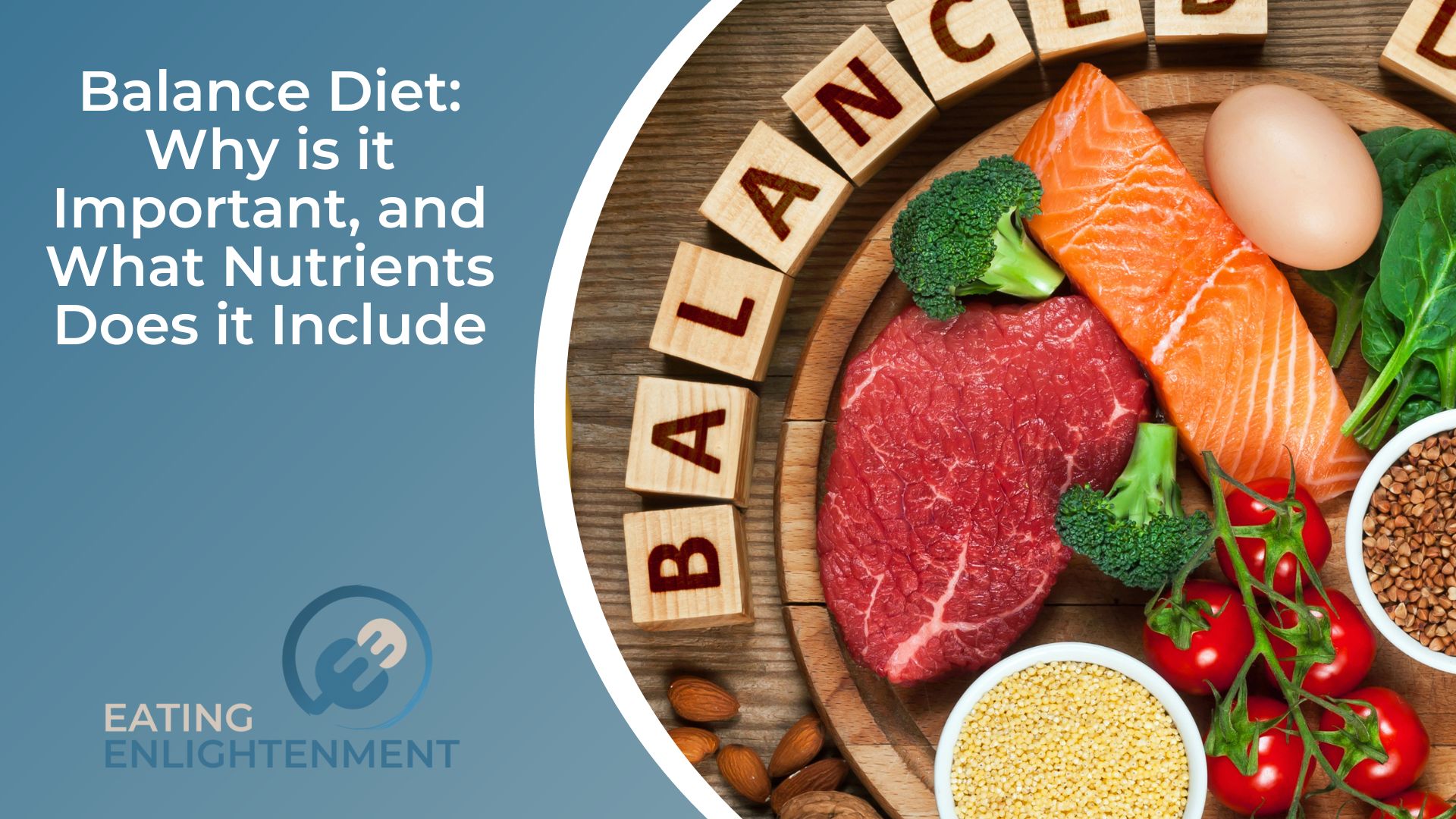In our quest for optimal health, the significance of a balanced diet often takes center stage. This comprehensive exploration aligns with the philosophy of Eating Enlightenment, shedding light on the myriad ways a balanced diet impacts our physical health, mental clarity, and emotional stability.
We aim to unravel the complexities of essential nutrients and their pivotal role in our daily lives, highlighting their importance in a holistic health journey.

The Importance of a Balanced Diet
Physical Health and Prevention of Diseases:
Beyond mere sustenance, a balanced diet is a cornerstone of physical health. It’s about fueling our bodies with the right mix of nutrients to bolster the immune system, ward off illnesses, and keep our organs functioning optimally.
A diet rich in fruits, vegetables, lean proteins, whole grains, and healthy fats is linked to a lower incidence of chronic diseases like heart disease, diabetes, and certain forms of cancer. It’s not just about what we eat but how these nutrients work together to maintain our body’s equilibrium.

Mental and Emotional Well-being:
Our diet profoundly influences our brain health. Nutrients such as omega-3 fatty acids, antioxidants, vitamins, and minerals directly impact cognitive functions, mood regulation, and overall mental health.
A balanced diet supports neurotransmitter function, which plays a crucial role in mood and cognitive processes. This nutritional approach is in harmony with the mindfulness and mental clarity promoted by Eating Enlightenment.
Weight Management in a Healthy Way:
A balanced diet aids in maintaining a healthy, adequate weight, which is a byproduct of good health rather than the primary focus. It’s about nurturing the body with nutrient-dense foods rather than restricting calories or following fad diets.
Key Nutrients in a Balanced Diet

Carbohydrates:
Carbohydrates, especially complex ones from whole grains, fruits, and vegetables, provide sustained energy. They are also essential for brain function and digestive health.
Proteins:
Proteins are the builders of our body. They are crucial for muscle repair, growth, and the proper functioning of hormones and enzymes. Sources of high-quality protein include lean meat, fish, dairy, legumes, and nuts.
Fats:
Fats, particularly unsaturated fats, are vital for brain health, hormone production, and cell structure. Sources like avocados, nuts, seeds, and oily fish provide these essential fats.
Exploring Nutritious Food Options:
In maintaining a balanced diet, exploring the health benefits of different cultural foods is interesting. For instance, dolmas, a popular Mediterranean dish, are often discussed regarding their nutritional value. You might wonder, are dolmas healthy? According to Paliria, dolmas are indeed a healthy addition to a balanced diet, with ingredients like grape leaves, rice, and olive oil that provide a harmonious mix of carbohydrates, healthy fats, and various micronutrients.
Vitamins and Minerals:
These micronutrients, though needed in smaller amounts, play significant roles
In various bodily functions. Vitamins like A, C, D, E, and the B-complex are crucial for immune function, skin health, energy production, and more.
Minerals like calcium, potassium, and magnesium support bone health, nerve function, and muscle contractions. A diverse diet that includes a range of fruits, vegetables, lean proteins, and whole grains typically provides a sufficient array of these vital nutrients.
Water:
Essential for life, water plays a critical role in every bodily function. It aids in digestion, absorption of nutrients, and elimination of wastes. Staying adequately hydrated is crucial for maintaining energy levels, cognitive function, and overall health.
Incorporating a Balanced Diet into Daily Life
Mindful Eating:
This involves being fully present during meals, savoring each bite, and being attuned to the body’s hunger and fullness cues. It’s about appreciating the flavor and nutritional value of food rather than eating out of habit or emotion.
The World Health Organization underscores the importance of a balanced diet in preventing noncommunicable diseases and maintaining health
Diverse and Colorful Plate:
A visually appealing meal with a variety of colors not only provides aesthetic pleasure but also ensures a range of nutrients. Each color in fruits and vegetables represents different nutrients, so a colorful plate is a healthy plate.
Listening to Your Body:
Each individual’s body has unique nutritional needs. Paying attention to how foods affect energy levels, mood, and overall health can guide better food choices.
Psychological Perspective on a Balanced Diet
The Psychology of Eating:
Our food choices are often influenced by our emotions, stress levels, and environmental cues. A balanced diet can help stabilize mood swings and improve emotional well-being.
Mindfulness and Eating Habits:
Mindful eating is deeply intertwined with a balanced diet. It encourages a healthier relationship with food, where choices are made based on nourishment and satisfaction rather than emotional cravings.
The Science Behind a Balanced Diet (50 words)
Scientific research underscores the health benefits of a balanced diet. A study in
The National Institutes of Health (NIH) highlights the link between a varied diet and reduced risk of chronic diseases (Science Link).
Conclusion
A balanced diet is more than just food; it’s a lifestyle choice promoting physical, mental, and emotional health. It’s aligned with Eating Enlightenment’s philosophy, emphasizing a holistic approach to nutrition and well-being. Understanding and implementing the principles of a balanced diet is crucial for personal health and plays a significant role in professional fields, particularly in healthcare.
For those interested in or currently pursuing a career in healthcare, the knowledge and application of nutritional principles are invaluable. To further explore how a foundational understanding of diet and nutrition can enhance your professional journey in the healthcare sector, be sure to read our insightful article, “Building Success: Strategies for a Thriving Healthcare Career Path.” This resource offers comprehensive strategies and insights for those aspiring to make a significant impact in healthcare. Dive into the article and discover how to build a successful and rewarding career in this dynamic and essential field.



